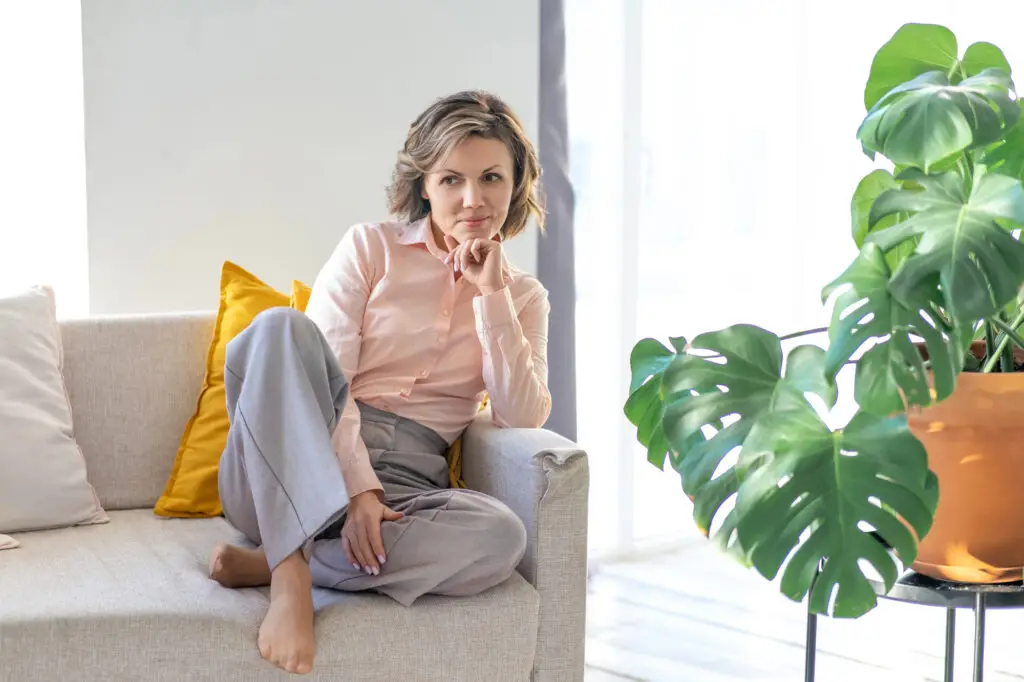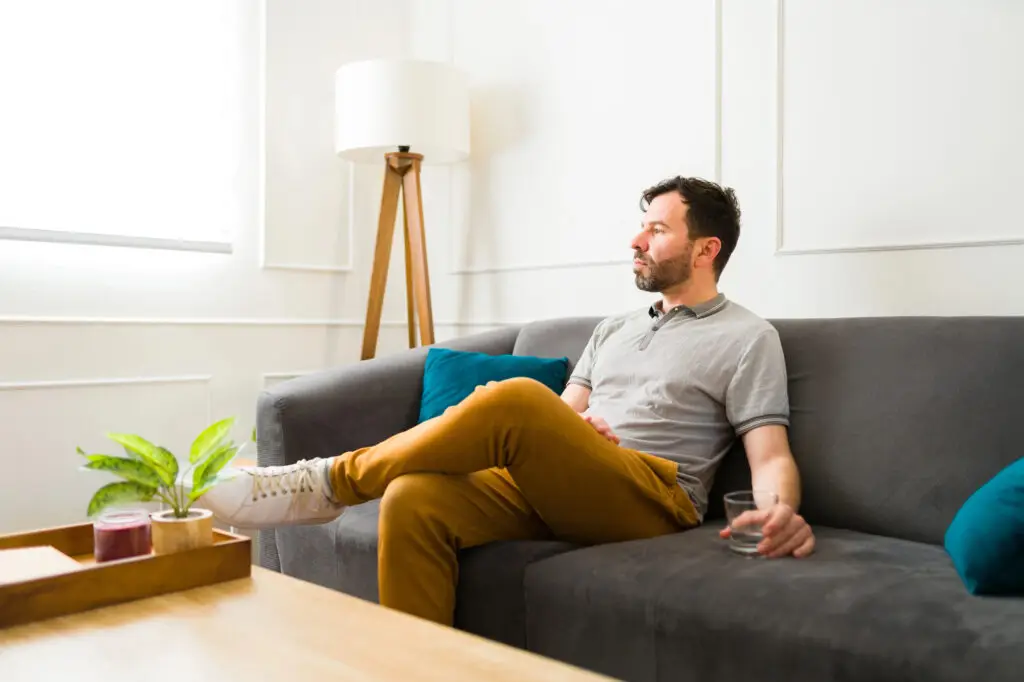
Personalized mind–body support to restore balance, clarity, and forward momentum.

Support for Steadiness and Alignment With What Matters Most
Some people seek relief from stress, anxiety, or exhaustion. Others feel stable enough but want more energy, clarity, or direction. Many experience both.
Yoga therapy isn’t only about what you do — it’s also about how you understand yourself and your life.
While many people picture yoga as physical poses, yoga therapy uses a much wider range of approaches — many involving little or no movement.
Personalized, not one-size-fits-all.
Sessions may include guided reflection, meditation, breath practices, gentle movement, or practical tools for daily life, depending on what will be most supportive for you.
Rooted in practical philosophy.
This tradition offers grounded ways of understanding patterns, values, relationships, and the roots of stress or dissatisfaction.
Focused on real change.
Together we explore new ways of seeing, responding, and envisioning what comes next — not just techniques for coping.
No prior yoga or meditation experience is required.
How This Work Supports You
Yoga therapy works with the deeper patterns that shape how experiences are held in the body and mind.
Through breath, sensation, movement, attention, and guided reflection, these patterns can begin to soften, allowing greater ease, clarity, and coherence to emerge.
Rather than relying on insight alone, this approach supports change at the level where patterns actually live — in the nervous system, body, and everyday experience.
People come to this work for different reasons — sometimes to find relief, sometimes to move forward, and often for both.
When You Need Support or Stability
You may be feeling overwhelmed, depleted, stuck, or out of balance. The focus is on regulation, steadiness, and restoring capacity.
Support may include:
• Sleep & insomnia
• Anxiety or low mood
• Grief & loss
• Chronic stress or burnout
• Emotional steadiness
• Reconnecting with the body after overwhelm
When You’re Ready for Growth or Direction
When something in you simply wants to expand, clarify, or come alive again.
Support may include:
• Reconnecting with values or purpose
• Sustaining energy for meaningful work or projects
• Navigating transitions or new chapters
• Reclaiming creativity or expression
• Clarifying direction or decision-making
• Living more intentionally and in alignment
Most People Experience a Blend
Relief and growth are not separate paths. As the nervous system settles, energy often returns — and with it, curiosity, creativity, and forward movement.
Some people come because something hurts. Others come because something new is trying to emerge.
As regulation improves, many people notice natural shifts in sleep, mood, relationships, creativity, and daily life.
Sessions are gentle, paced, and personalized to where you are right now and how you want to move forward.
Practices may include movement, breathwork, meditation, reflective dialogue, and principles from yoga psychology — offered with care, choice, and respect for your nervous system.
People often come to this work for support with:
Sleep & insomnia • anxiety or low mood • grief & loss • chronic stress • emotional steadiness • reconnecting with the body, values, or creativity.
Fees & Sliding Scale
Sessions are offered on a sliding scale so you can choose a level that feels workable for you. A limited number of supported series are also available at no cost.
If finances are a barrier right now, you’re welcome to request this option. No explanation required. I work on an honor system and trust you to know what you need.
Complimentary series are limited to four sessions.
Use the form below or email sarah@possiblebydesign.com with questions or curiosities.
—Sarah
Prefer to connect first?
Schedule a 15-minute clarity session→
Learn more about Sarah →
What Would You Like Support With?
Yoga therapy can support both stability and growth — from sleep challenges and stress to values, creativity, and meaningful change. Let me know what feels most relevant for you right now.
Frequently Asked Questions
What is yoga therapy?
Yoga Therapy applies the tools of yoga—such as breath, movement, relaxation, and awareness—to support overall well-being. Unlike a standard yoga class, yoga therapy sessions are tailored to the needs of the individual or group. They may include practices for stress relief, sleep, grief, mood, or life transitions. Yoga Therapy is not a replacement for medical or mental health treatment, but it can be a supportive complement alongside other forms of care.
What happens in a yoga therapy session?
Each session begins with a brief check-in to understand your needs and intentions for the day. From there, we may work with breath, gentle movement, restorative postures, or guided rest practices such as Yoga Nidra. Reflection—whether through quiet time, discussion, or journaling—may also be part of the process. Sessions are collaborative, paced with care, and always adapted to your unique needs
Do I need previous experience with yoga?
No experience is required. Yoga Therapy is designed to meet you exactly where you are. All practices—whether breath, movement, or rest—are adapted to your comfort level and capacity. Sessions are guided step by step, with choice and pacing built in, so you can feel supported whether you are brand new to yoga or already have experience.
How is yoga therapy different from a regular yoga class?
A regular yoga class typically follows a set sequence and is designed for a group. Yoga Therapy is more individualized and focuses on your specific needs, whether in a one-on-one or small group setting. Sessions may include breath, movement, guided rest, or reflection, with each practice adapted to your comfort level and goals. The emphasis is on support and personal well-being, not performance or achievement.
How is yoga therapy different than traditional talk therapy?
Counseling and talk therapy focus on verbal processing, reflection, and exploring thoughts, emotions, and behaviors. Yoga Therapy is a body-based approach that uses movement, breath, rest, and awareness practices to support well-being.
Someone might choose Yoga Therapy when they want to work more directly with the body and nervous system, or when stress, grief, or burnout feel “stuck” in the body in ways that words alone don’t resolve. Yoga Therapy can also complement counseling, offering physical and somatic tools that support the insights gained in therapy.
How is Yoga Therapy different from physical therapy?
Yoga Therapy can help reduce pain, improve mobility, and support overall function through breath, gentle movement, and awareness practices. However, it is not physical therapy. Physical therapy is a licensed medical treatment focused on diagnosing and rehabilitating specific injuries or conditions. Yoga Therapy does not diagnose or treat medical issues. Instead, it offers supportive, adaptive practices that may complement physical therapy or other forms of care.
Someone might choose Yoga Therapy when they want a more holistic, whole-person approach that addresses not only the body but also stress, mood, sleep, and overall well-being. Yoga Therapy may also be supportive once physical therapy has ended, helping you maintain progress, prevent relapse, and reconnect with your body in daily life.
Are sessions online or in person?
Most Yoga Therapy sessions are offered online via secure video. This allows you to join from anywhere. For clients in the Minneapolis-St. Paul are, in-person sessions are available by arrangement.
Scheduling and payment are handled through my booking system below.
If you’re looking for group-based or ongoing practice, you may prefer workshops or the Return to Radiance group program.